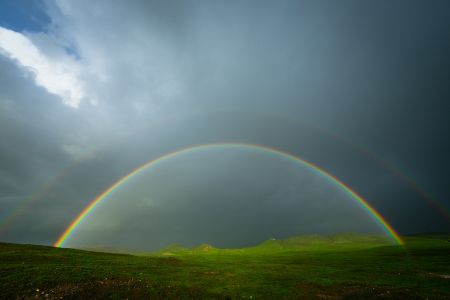“What about the fish, what happened to the fish?” the eager fifth grader asked without even raising his hand.
“What do you mean, what about the fish?” I responded.
“In the flood, what happened to the fish?” he asked.
I had been invited to speak to an elementary school class about the early stories in Genesis. Of all the questions I had anticipated, it’s safe to say I was not ready for one about the fish. “I don’t know,” I said. “I guess they got lucky.”
His look told me that my answer was not correct. I didn’t realize I was going toe to toe with a PK. “No sir, the flood waters changed the salinity of the water. They all died too.” I had to pause to remind myself that I wasn’t there to engage in an exegetical battle with an elementary school student, but I do hope my look told him I thought he was wrong.

The story of the flood is fascinating for many reasons. On the surface, it’s a horrible story. God is so fed up with the sinfulness of humankind that God decides to kill (almost) everything and start over. Somehow, we have turned this narrative of mass extinction into a cute children’s story.
From a biblical scholar’s perspective, there are many questions. What is contained in Genesis 6-9 is actually made up of two different flood stories that had circulated separately and were blended together. The clearest evidence of this is the description of two of every animal being included on the ark in Gen 6:19 compared with the two of every unclean animal and 7 pairs of every clean animal in Gen 7:2. I wonder what differentiated clean vs unclean animals if the law hadn’t been given yet? Even more interesting is how the Jewish flood stories compare with other flood narratives like the Gilgamesh Epic and the Atrahasis Myth that predate the composition found in Genesis.
The flood story still intrigues people today. The Ark Encounter in Williamstown, Kentucky, is a popular Christian theme park that attracts over 1 million paid visitors annually. Tremendous care has gone into the recreation of a massive ark that housed so many animals. While I applaud the commitment to scripture, this theme park, as well as its near-by cousin the Creation Museum, represent a classic example of what it means to ask what I might call secondary questions from the Bible. These questions revolve around the “how” of the flood. Was it a universal global flood or was it a limited deluge? Had it ever even rained before the flood? And let’s not forget about the dinosaurs, if those things are even real.
Instead of focusing on the “how” of the flood, a better question would be “why?”
‘Why does Genesis record the flood?” “What was the purpose?” “What can we learn about God and ourselves?” These are better questions as we contemplate this catastrophe. First, we see a humanity that chose chaos. It’s important to remember that Judaism has no concept of original sin. Rather, it generally understands that all of humanity is given two inclinations, one evil and one good. Humanity is given the freedom to follow either of these inclinations. Gen 6:5 records that “every inclination of their hearts was evil all the time.” We are also introduced to an anthropomorphic God. God regretted that he had made humanity. His creation experiment had failed. In his anger, God decided to destroy the world by allowing the chaos of the deep to cover the earth once again.

In the midst of the evil, God finds a righteous man, Noah, and saves him. We are not told how he is considered righteous, but God spares him and his family from the flood. As the waters eventually subside, as Noah offers a sacrifice, God promises never to destroy the earth with another flood. An end has come to the chaos. As a reminder of this covenant, God puts his bow in the clouds. Two things are worth noting. First, rather than being a pretty arc in the sky, the image in Genesis is one of God hanging up his weapon. Second, the bow in the sky is a reminder for God rather than humanity. When God gets angry and the chaotic waters appear, the sight of his bow on the shelf will remind God of God’s promise.
I wonder what it might mean if we spent as much time, money, and energy on the why of the flood rather than the how? What does it mean for us and for the world to worship a God who desires to restore rather than destroy? As image bearers of this God, what does it mean for us to be agents of redemption rather than destruction? What does it mean for us to bring shalom to an evil world rather than chaos? In a world whose hearts seem to be bending more and more towards an evil inclination, what does it mean for the church to participate in God’s restoration? If we tackle those questions, the fish, and maybe even the dinosaurs, will take care of themselves.


8 Responses
Thanks for opening my eyes.
Great questions at the end, especially in the crazy environment we find ourselves in today. “What does it mean to bring shalom to an evil world rather than chaos? – a challenge, indeed. I also ask myself, As Christ followers, what does it mean to lay down our weapons of war (both physical weapons and the weapons of our words) and seek reconciliation and understanding?
Yes, I agree – the questions at the end make for great discussion material for church groups, college classes, and of course synods.
“What does it mean for us and for the world to worship a God who desires to restore rather than destroy?” If we accept the flood story as literal, one could also ask what does it say about a God who destroyed quite a bit before restoring anything? Noah’s ark has always left me a bit uncomfortable. Could some read it and use it to justify genocide?
I have to admit, as a kid, I was enthralled by the fate of the fish as well. Had never heard the “salinity” theory, though.
I share Gregory’s concern: What if this story encourages the idea of “genocide?” I feel the same discomfort about OT battles that imply God plays a role in certain Israeli victories, resulting in the deaths of thousands. Or, how is it that Herod was allowed to have the boys under two slaughtered in his attempt to kill Jesus?
These tensions are difficult to resolve, and you have provided a partial solution by asking us to focus on the theme of restoration rather than destruction! Thanks, Chad!
What a wonderful and thoughtful approach to these old accounts. Your interpretation reveals a very merciful and loving message for our encouragement.
Some have been troubled with these accounts in that they reveal a God that reportedly “nacham” changed his mind and/or regretted what had done at creation. Later in the story God relents when he smells the sacrifice of Noah. This anthropomorphism can be a hurdle for the modern day reader.
But it can also lend hope in that God’s mercy is the bottom line constant in these accounts. This ever changing God who increasingly is opening his heart toward mercy is in line with your interpretation and with other later passages which indicate an ever widening of his love. When this love works through Jesus, it becomes a very widely inclusive love. We can, indeed, take heart in this underlying and ever increasing mercy as God unfolds such great love for his creation for his creators.
This is exactly right and so well said. God’s grace, like a loving parent, moves God to act on behalf of his children. Thanks for taking the time to engage this.